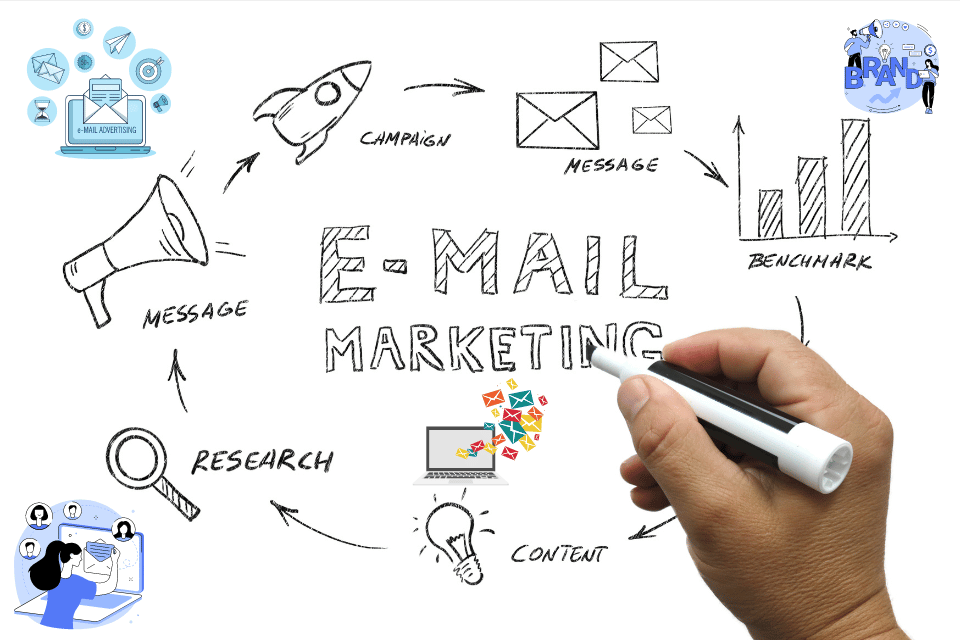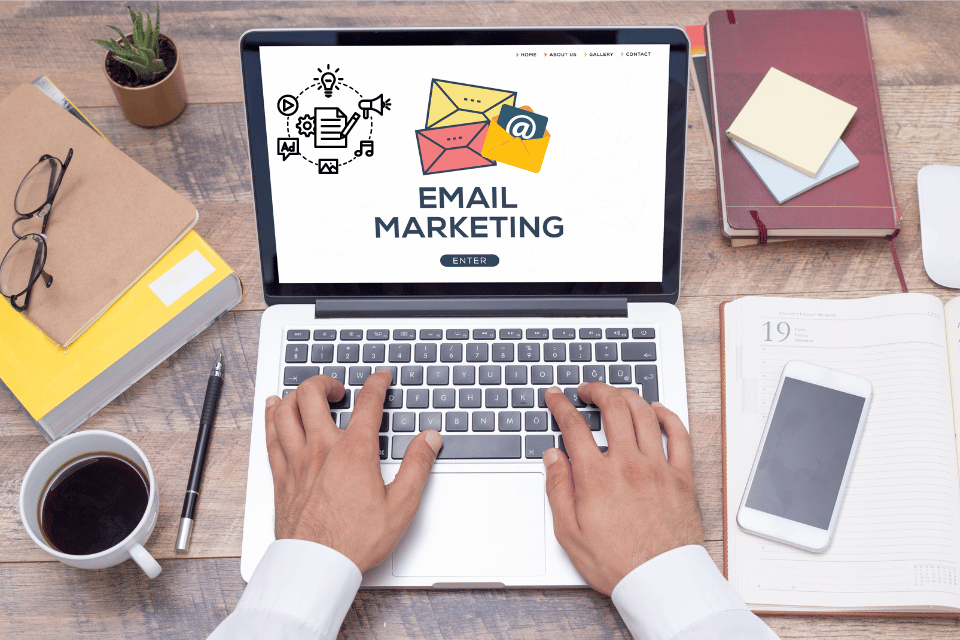Email Marketing in the Age of Advanced Digital Experiences

Email marketing has long been a cornerstone of effective communication between businesses and their customers. Consumer expectations are higher than ever, email marketing has proven to be one of the most resilient and effective tools in a marketer's arsenal. While new platforms and technologies continually emerge, offering fresh ways to connect with audiences, email remains unmatched in its ability to deliver personalized, impactful messages directly to the consumer's inbox. However, what worked in the past won't cut it anymore. What once was a simple tool now demands a more nuanced and sophisticated strategy. To truly leverage the power of email marketing in this advanced digital age, businesses must adopt more refined and intelligent strategies that align with the sophisticated demands of their audience.
In this blog, we'll explore the current state of email marketing, delve into the advancements that are shaping its future, and provide actionable insights for C-suite executives looking to enhance their digital marketing efforts through smarter, more targeted email campaigns

The Evolution of Email Marketing: From Mass Messages to Hyper-Personalization
Email marketing has come a long way from its early days of mass messaging, where a single generic message was sent to an entire email list. Today, email marketing is characterized by hyper-personalization, driven by advancements in data analytics, automation, and artificial intelligence. Modern consumers expect emails to be relevant, timely, and tailored to their individual preferences and behaviors.
One of the key drivers of this evolution is the ability to leverage customer data to create highly personalized email experiences. For example, Netflix’s recommendation emails are a prime example of hyper-personalization. By analyzing user viewing history, Netflix can suggest movies and shows that are likely to appeal to each subscriber. This level of customization enhances both engagement and consumer loyalty.
Another aspect of this evolution is the shift towards triggered emails, which are sent in response to specific actions or behaviors of the recipient. These emails, such as abandoned cart reminders or birthday offers, are highly effective because they are contextually relevant and timely. According to industry insights, triggered emails have a significantly higher open rate than traditional marketing emails, highlighting the importance of timing and relevance in modern email marketing strategies.
The Role of AI and Automation in Enhancing Email Campaigns
Automation and artificial intelligence (AI) are revolutionizing email marketing for businesses. AI-powered tools can analyze vast amounts of data to predict customer behavior, optimize send times, and even generate personalized content. This allows marketers to create highly targeted campaigns that resonate with their audience on a deeper level.
One of the most impactful applications of AI in email marketing is predictive analytics. By analyzing past interactions, AI can predict what type of content a subscriber is most likely to engage with, and when they are most likely to open an email. This enables marketers to send the right message at the right time, increasing the likelihood of conversion.
For instance, a retail brand might use AI to analyze purchase history and send personalized product recommendations to customers who have shown an interest in similar items. This not only boosts the customer experience but also enhances revenue by offering them products that they are more inclined to buy.
Automation, on the other hand, streamlines the process of email marketing by allowing businesses to set up workflows that automatically send emails based on specific triggers. This can include welcome emails for new subscribers, follow-up emails after a purchase, or re-engagement emails for inactive subscribers. By automating these processes, businesses can maintain consistent communication with their audience without requiring constant manual intervention.
While automation and artificial intelligence have many advantages, it's important to find a balance between automation and human interaction. An audience gap and a lack of personalization might result from over-automation. Therefore, businesses should ensure that their automated campaigns still reflect their brand’s voice and values.
Integrating Email Marketing with Other Digital Channels for a Cohesive Customer Experience
Consumers interact with brands across multiple channels, including social media, websites, mobile apps, and more. To create a cohesive and seamless customer experience, it is essential to integrate email marketing with these other digital channels.
One effective strategy is to use email as a bridge between online and offline experiences. For example, a retail brand could send personalized emails to customers based on their in-store purchases, encouraging them to explore similar products online. Conversely, data collected from online interactions can be used to personalize in-store experiences, creating a consistent and connected journey for the customer.
Another key aspect of integration is ensuring that the messaging across all channels is consistent. This means that the content, tone, and visuals used in emails should align with those used on social media, websites, and other platforms. Consistency helps to reinforce the brand’s identity and makes it easier for customers to recognize and connect with the brand.
Moreover, email marketing can play a pivotal role in retargeting campaigns. By combining email with digital advertising, businesses can create highly targeted campaigns that reach customers who have interacted with the brand but have not yet converted. For instance, a customer who abandons a shopping cart can be retargeted with an email offering a discount, followed by a social media ad reminding them of the items left behind.
To achieve successful integration, businesses need to adopt a holistic approach to digital marketing, where email is not treated as a standalone channel but as part of a broader strategy aimed at delivering a unified customer experience.
Measuring Success and Continuously Optimizing Email Campaigns
To ensure the effectiveness of email marketing campaigns, it is essential to measure their performance and continuously optimize them based on the insights gained. Key performance indicators (KPIs) such as open rates, click-through rates, conversion rates, and unsubscribe rates provide valuable insights into how well an email campaign is resonating with its audience.
One of the most effective ways to optimize email campaigns is through A/B testing. This involves creating two versions of an email with slight variations, such as different subject lines, visuals, or call-to-action (CTA) buttons, and sending them to different segments of the audience. By analyzing the performance of each version, businesses can identify which elements are most effective and make data-driven decisions to improve future campaigns.
For instance, an e-commerce brand might test different subject lines to determine which one generates the highest open rate. The insights gained from this test can then be used to craft more compelling subject lines for future campaigns, ultimately leading to higher engagement and conversion rates.
Another important aspect of optimization is segmentation. By dividing the email list into smaller segments based on criteria such as demographics, purchase history, or engagement level, businesses can create more targeted campaigns that are more likely to resonate with each segment. This not only improves the effectiveness of the campaigns but also enhances the customer experience by delivering content that is relevant and meaningful.
Ethical Considerations in Modern Email Marketing
As email marketing evolves, so does the need for ethical considerations, particularly around data privacy and consumer trust. In an age where consumers are increasingly aware of how their data is collected and used, businesses must ensure that their email marketing practices are not only effective but also ethical.
One of the foundational principles of ethical email marketing is transparency. Consumers should know exactly how their data is being used and for what purposes. Clear disclosure about data usage, along with explicit approval from subscribers, is required. This not only builds trust but also aligns with global regulations like GDPR and CCPA, which mandate that businesses respect user privacy.
For instance, rather than automatically opting subscribers into multiple email lists, businesses should allow users to choose the types of emails they wish to receive. By being transparent and providing options, companies can enhance customer loyalty and reduce the likelihood of complaints or unsubscribes.
Email fatigue is a real issue in today's marketing world. Overloading users with emails can cause disengagement, higher unsubscribe rates, and even an adverse impression of the brand. It’s crucial to respect the inbox by carefully managing the frequency of emails sent.
A more sustainable approach involves segmenting your audience based on engagement levels and tailoring the frequency of emails to their preferences. For example, more engaged users might appreciate frequent updates, while less active users could benefit from less frequent, more curated content. This strategy not only respects the subscriber's time but also improves the overall effectiveness of your campaigns.
Artificial intelligence is a powerful tool in email marketing, offering opportunities for enhanced personalization and automation. However, it’s important to use AI ethically. Automated decisions should be free from bias and should not lead to intrusive or overly aggressive marketing tactics.
For example, AI can help determine the best times to send emails or suggest personalized content, but businesses should ensure that these decisions respect the individual’s privacy and preferences. It’s vital to avoid crossing the line from helpful personalization into what might be perceived as invasive behavior. By maintaining this balance, companies can use AI to enhance the customer experience while upholding ethical standards.
The Way Ahead: Email Marketing as a Strategic Asset in the Digital Age
As digital experiences continue to evolve, email marketing will remain a critical component of any successful marketing strategy. However, to maximize its potential, businesses must embrace the advancements in data analytics, AI, and automation while maintaining a human touch in their communications. By integrating email with other digital channels, businesses can create a cohesive and seamless customer experience that drives engagement and loyalty.
C-suite executives must recognize the strategic value of email marketing and invest in the tools and technologies that enable hyper-personalization, automation, and continuous optimization. By doing so, they can ensure that their email marketing efforts are not only effective but also aligned with the broader goals of the organization.
Ready to elevate your email marketing strategy?
Explore more of our expert blogs on our website for tailored insights and solutions that drive results in the age of advanced digital experiences.




